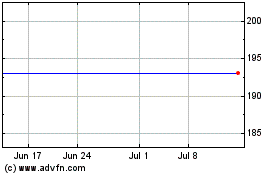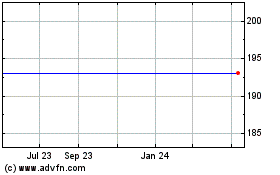(FROM THE WALL STREET JOURNAL 11/25/15)
By Liz Hoffman
It isn't boring to be a tax attorney these days.
Just ask the team at Skadden, Arps, Slate, Meagher & Flom
LLP working on Pfizer Inc.'s $155 billion deal with Allergan PLC.
Their immediate task is getting the biggest tax-lowering merger in
history past U.S. authorities.
Meanwhile, they are facing off with the Internal Revenue Service
to get tax-free treatment for Yahoo Inc.'s spinoff of its $20
billion stake in Alibaba Group Holding Ltd. -- an effort the agency
dealt a setback in September -- as well as shepherding a pair of
other big transactions that would move U.S. companies overseas.
The deals have landed Skadden in the middle of an election-year
debate about U.S. tax policy and corporate tax planning, with
billions of dollars riding on the firm's efforts.
"It does seem like they are involved in all of the really
difficult and controversial deals," said Robert Willens, an
independent tax analyst. "They have a great reputation in the tax
area, but if they are found to be wrong on one or two, they go from
looking aggressive and smart," he cautioned, "to just looking
aggressive."
The merger announced Monday would move Pfizer's legal home to
Ireland, cutting its tax rate to about 17% from about 25% and
giving the company the ability to use the cash it has generated
overseas without paying hefty taxes.
It came just four days after U.S. regulators released new
guidelines to discourage inversions, their second attempt in 14
months to deter transactions with foreign companies that can be
used to move U.S. corporations into lower tax jurisdictions
overseas.
The new rules, which are narrowly written, are unlikely to
derail the Pfizer-Allergan deal. But they put the 166-year-old drug
company and its advisers squarely at odds with regulators.
Last week, Treasury Secretary Jacob Lew blamed "creative
accountants and lawyers" for helping U.S. companies sidestep
taxes.
A Skadden spokeswoman declined to comment.
Wachtell, Lipton, Rosen & Katz was the lead M&A adviser
to Pfizer, taking a role long held by Skadden.
Skadden's lawyers played a role in the boom in inversions. In
2010, a group of Skadden lawyers from New York and London
brainstormed ways to rev up the sluggish deals market as they biked
through southern France, The Wall Street Journal has reported. They
dusted off the idea of inversions, which had been around for years
but sparingly used. After they returned, they started pitching
ideas to banks, opening up a lucrative line of business.
Since 2013, Skadden has advised on 12 of 28 proposed inversion
deals valued at about $430 billion, representing about 72% of such
transactions by dollar value, according to Thomson Reuters. Skadden
was the lead adviser to Pfizer on its unsuccessful courtship of
AstraZeneca PLC, another would-be inversion. It also advised U.S.
drug firm AbbVie Inc. on the tax and financing aspects of its $54
billion acquisition of Ireland's Shire PLC. That deal collapsed in
October 2014 after the Treasury's first attempt to discourage
inversions.
The firm is working on a number of other deals that, in one way
or another, could test the limits of tax law and the patience of
regulators.
In addition to Yahoo, Skadden is representing Darden Restaurants
Inc. on the separation of its real estate, chip maker Broadcom
Corp. on its $37 billion sale to Singapore's Avago Technologies
Ltd., and fertilizer maker CF Industries Holdings Inc.'s purchase
of Dutch rival OCI NV.
Some of Skadden's pursuits have gone well. Darden, the owner of
the Olive Garden chain, received the IRS's blessing for its
real-estate spinoff, despite comments from the agency that it was
concerned about such transactions.
The jury still is out on others. In the Yahoo deal, Skadden
delivered an opinion that said Yahoo's spinoff of its Alibaba stake
would satisfy the government's requirements to be tax-free. But
when the technology company sought an IRS ruling to that effect,
the agency declined to grant one. The same is true of the pending
sale of Skadden client Broadcom to Avago. Both deals may ultimately
end up being deemed tax-free.
Pfizer CEO Ian Read had been pursuing a tax inversion since the
attempted merger with AstraZeneca last year.
The company set its sights on Dublin-based Allergan, which,
through a series of acquisitions, had become big enough to serve as
an inversion target for the behemoth Pfizer.
When the Treasury released the guidance at 5 p.m. last Thursday,
lawyers on both sides pored over the notice and by late evening had
come to the same conclusion: The deal was safe.
---
Shayndi Raice contributed to this article.
Subscribe to WSJ: http://online.wsj.com?mod=djnwires
(END) Dow Jones Newswires
November 25, 2015 02:47 ET (07:47 GMT)
Copyright (c) 2015 Dow Jones & Company, Inc.
Allergan (NYSE:AGN)
Historical Stock Chart
From Mar 2024 to Apr 2024

Allergan (NYSE:AGN)
Historical Stock Chart
From Apr 2023 to Apr 2024
